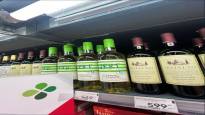It is generally suspected that the holdings will eventually end up in the hands of the Kremlin’s creditors, writes Russia correspondent Heikki Heiskanen.
Heikki HeiskanenRussia correspondent
MOSCOW The wartime has led to a new confusion of ownership relationships in the Russian economy. The role of the state is emphasized again, and not only in the defense industry.
RBK economy magazine noticed on Thursday, that the country’s largest wine producer Kuban-Vino is now registered as state property in the state register.
Kuban-Vino previously belonged to the agricultural company Arianti, whose ownership was awarded to the state by an arbitration court this month.
The wave of nationalization has recently swept away especially Chelyabinsk in the Urals, which is an important concentration of the metal industry.
The Kuban-Vino case is linked to businessmen from Chelyabinsk Yuri to Antipov and Aleksandr Aristovii. In the 90s, they founded the multi-branch company Ariant, which also owned Kuban-Vino. In 2020, they divided their holdings: Arianti’s food and wine industry remained with Aristov, and metal factories with Antipo.
Last February, the arbitration court accepted the state prosecutor’s office’s demand that Antipov’s metal companies should be transferred to the state.
According to the Prosecutor’s Office, Antipov privately companies for themselves illegally in the 90s. In addition, the justification was that the companies had ended up under the control of residents of unfriendly countries, which threatens Russia’s national interests and security.
Kuban-Vino and other agricultural companies were not involved in the privatization, but according to the prosecutor, Antipov had acquired them with the funds he received thanks to the privatization of metal companies. So they also had to go to the state.
RBK’s according to the information Antipov’s metal factories can be transferred to the state-owned defense industry company Rostec. It is controlled by the president Vladimir Putin belonging to a close circle Sergei Chemesov.
State Prosecutor of Russia Igor Krasnov boasted in his statement to the Kommersant newspaper in the interviewthat from 2023, 15 strategic companies worth more than 333 billion rubles have been returned to state ownership.
However, not only companies connected to the defense sector have been subject to nationalization, as the cases of Kuban-Vino, car trading company Rolf and pasta manufacturer Makfa show.
RBK economy magazine by as of February 2022, the prosecutor’s office has made more than 55 subpoenas to transfer the shares and real estate of companies to the control of the state.
The holdings of foreign companies have also been targeted, such as the power plants owned by the Finnish company Fortum in Russia.
President Putin has deniedthat Russia is dismantling the privatizations of the 1990s.
However, it strongly seems that the Russian prosecution authorities have opened that can of worms. That’s hardly what they would have done had the Kremlin not given the green light.
When the Russian state took over the methane producer Metafrax last year, the justification was that the chemical company was privatized in 1992 without a decision from the Russian government.
Privatizations were handled by the regional authorities at the time, so the decision may enable the dismantling of all privatizations of that time.
This is sure to send shivers down your spine To Russian business circles, which may of course be the authorities’ intention.
Public property inherited from the Soviet Union was privatized in the Russia of the 90s hastily and often through rather obscure patterns.
Those in power at that time were in a great hurry to create a new owning class in the country, whose interests would be to oppose the communists’ return to power.
The letter and spirit of the law were often not followed in a hurry. That is why property protection remained weak in Russia.
This was bitterly experienced by the “oligarchs”, i.e. politically influential big businessmen, who came into conflict with Putin’s administration.
The most famous case is the one known as the richest man in Russia at the beginning of the 2000s Mikhail Khodorkovsky. The oil company Yukos he founded ended up being taken over by the state-owned Rosneft.
Now they have come under the attention of the authorities many much smaller businessmen and smaller companies.
It is likely that the nationalized companies will end up under the control of businessmen favored by the Kremlin.
The redistribution of assets can be a way to build a new and even more loyal business elite to the current management.
Questioning the privatizations of the 90s can bring many more turmoils to the Russian economy.
Vladimir Putin came to power by promising stability to both ordinary citizens and the business elite of the new Russia. That promise is becoming more and more a thing of the past.
